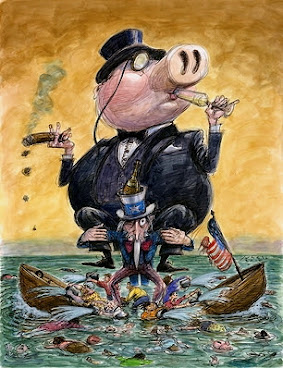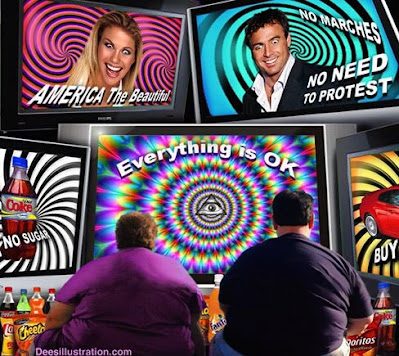"JFK's Executive Order 11100 Abolishing the Federal Reserve"
by John P. Curran
“Article 1, Section 8 of the US Constitution specifically says that Congress is the only body that can "coin money and regulate the value thereof." The US Constitution has never been amended to allow anyone other than Congress to coin and regulate currency. So what’s the Federal Reserve?
In 1910 Senator Nelson Aldrich, then Chairman of the National Monetary Commission, in collusion with representatives of the European central banks, devised a plan to pressure and deceive Congress into enacting legislation that would covertly establish a private central bank. This bank would assume control over the American economy by controlling the issuance of its money. After a huge public relations campaign, engineered by the foreign central banks, the Federal Reserve Act of 1913 was slipped through Congress during the Christmas recess, with many members of the Congress absent. President Woodrow Wilson, pressured by his political and financial backers, signed it on December 23, 1913. The act created the Federal Reserve System, a name carefully selected and designed to deceive. "Federal" would lead one to believe that this is a government organization. "Reserve" would lead one to believe that the currency is being backed by gold and silver. "System" was used in lieu of the word "bank" so that one would not conclude that a new central bank had been created.
In reality, the act created a private, for profit, central banking corporation owned by a cartel of private banks. The Federal Reserve Bank, a.k.a Federal Reserve System, is a Private Corporation. Black's Law Dictionary defines the "Federal Reserve System" as: "A Network of twelve central banks to which most national banks belong and to which state chartered banks may belong. Membership rules require investment of stock and minimum reserves." Privately-owned banks own the stock of the FED. Who owns the FED? The Rothschilds of London and Berlin; Lazard Brothers of Paris; Israel Moses Seif of Italy; Kuhn, Loeb and Warburg of Germany; and the Lehman Brothers, Goldman, Sachs and the Rockefeller families of New York. Did you know that the FED is the only for-profit corporation in America that is exempt from both federal and state taxes? The FED takes in trillions of dollars per year tax free! The banking families listed above get all that money.
The FED basically works like this: The government granted its power to create money to the FED banks. They create money, then loan it back to the government charging interest. The government levies income taxes to pay the interest on the debt. On this point, it's interesting to note that the Federal Reserve Act and the sixteenth amendment, which gave Congress the power to collect income taxes, were both passed in 1913. The incredible power of the FED over the economy is universally admitted. Any one person or any closely knit group who has a lot of money has a lot of power. Now imagine a group of people who have the power to create money. Imagine the power these people would have. This is exactly what the privately owned FED is!
An often overlooked aspect of John F. Kennedy's attempt to reform American society involves money. Kennedy apparently reasoned that by returning to the Constitution, which states that only Congress shall coin and regulate money, the soaring national debt could be reduced by not paying interest to the bankers of the Federal Reserve System, who print paper money then loan it to the government at interest. He moved in this area on June 4, 1963, by signing Executive Order 11110 which called for the issuance of $4,292,893,815 in United States Notes through the U.S. Treasury rather than the traditional Federal Reserve System. That same day, Kennedy signed a bill changing the backing of one and two dollar bills from silver to gold, adding strength to the weakened U.S. currency.
When Kennedy signed this Order, it returned to the federal government, specifically the Treasury Department, the Constitutional power to create and issue currency- money - without going through the privately owned Federal Reserve Bank. President Kennedy's Executive Order 11110 gave the Treasury Department the explicit authority: "to issue silver certificates against any silver bullion, silver, or standard silver dollars in the Treasury." This means that for every ounce of silver in the U.S. Treasury's vault, the government could introduce new money into circulation based on the silver bullion physically held there. As a result, more than $4 billion in United States Notes were brought into circulation in $2 and $5 denominations. $10 and $20 United States Notes were never circulated but were being printed by the Treasury Department when Kennedy was assassinated.
It appears obvious that President Kennedy knew the Federal Reserve Notes being used as the purported legal currency were contrary to the Constitution of the United States of America. Kennedy knew that if the silver-backed United States Notes were widely circulated, they would have eliminated the demand for Federal Reserve Notes. This is a very simple matter of economics. The USN was backed by silver and the FRN was not backed by anything of intrinsic value. Executive Order 11110 should have prevented the national debt from reaching its current level (virtually all of the $35 trillion in federal debt has been created since 1963) if LBJ or any subsequent President were to enforce it. It would have almost immediately given the U.S. Government the ability to repay its debt without going to the private Federal Reserve Banks and being charged interest to create new "money". Executive Order 11110 gave the U.S.A. the ability to, once again, create its own money backed by silver and realm value worth something.
President Kennedy was assassinated on November 22, 1963 and the United States Notes he had issued were immediately taken out of circulation. Federal Reserve Notes continued to serve as the legal currency of the nation. According to the United States Secret Service, 99% of all U.S. paper "currency" circulating in 1999 are Federal Reserve Notes. It seems very apparent that President Kennedy challenged the "powers that exist behind U.S. and world finance."
Perhaps the assassination of JFK was a warning to all future presidents not to interfere with the private Federal Reserve's control over the creation of money. The Latin phrase, “Cui bono” ("To whose benefit?," literally "as a benefit to whom?”), is frequently applied in determining motive for a crime. Ask yourself, who had the most to lose if Kennedy had lived, and who benefited the most from Kennedy’s assassination? The answer is the same to both questions."
- http://rense.com/general76/jfkvs.htm
○
"No man did more to expose the power of the FED than Louis T. McFadden, who was the Chairman of the House Banking Committee back in the 1930s. In describing the FED, he remarked in the Congressional Record, House pages 1295 and 1296 on June 10, 1932: "Mr. Chairman, we have in this country one of the most corrupt institutions the world has ever known. I refer to the Federal Reserve Board and the Federal reserve banks. The Federal Reserve Board, a Government Board, has cheated the Government of the United States and he people of the United States out of enough money to pay the national debt. The depredations and the iniquities of the Federal Reserve Board and the Federal reserve banks acting together have cost this country enough money to pay the national debt several times over. This evil institution has impoverished and ruined the people of the United States; has bankrupted itself, and has practically bankrupted our Government. It has done this through the maladministration of that law by which the Federal Reserve Board, and through the corrupt practices of the moneyed vultures who control it."
Some people think the Federal Reserve Banks are United States Government institutions. They are not Government institutions, departments, or agencies. They are private credit monopolies which prey upon the people of the United States for the benefit of themselves and their foreign customers. Those 12 private credit monopolies were deceitfully placed upon this country by bankers who came here from Europe and who repaid us for our hospitality by undermining our American institutions.
The FED basically works like this: The government granted its power to create money to the FED banks. They create money, then loan it back to the government charging interest. The government levies income taxes to pay the interest on the debt. On this point, it's interesting to note that the Federal Reserve Act and the sixteenth amendment, which gave congress the power to collect income taxes, were both passed in 1913. The incredible power of the FED over the economy is universally admitted. Some people, especially in the banking and academic communities, even support it. On the other hand, there are those, such as President John Fitzgerald Kennedy, that have spoken out against it. His efforts were spoken about in Jim Marrs' 1990 book "Crossfire":
"Another overlooked aspect of Kennedy's attempt to reform American society involves money. Kennedy apparently reasoned that by returning to the constitution, which states that only Congress shall coin and regulate money, the soaring national debt could be reduced by not paying interest to the bankers of the Federal Reserve System, who print paper money then loan it to the government at interest. He moved in this area on June 4, 1963, by signing Executive Order 11110 which called for the issuance of $4,292,893,815 in United States Notes through the U.S. Treasury rather than the traditional Federal Reserve System. That same day, Kennedy signed a bill changing the backing of one and two dollar bills from silver to gold, adding strength to the weakened U.S. currency.
Kennedy's comptroller of the currency, James J. Saxon, had been at odds with the powerful Federal Reserve Board for some time, encouraging broader investment and lending powers for banks that were not part of the Federal Reserve system. Saxon also had decided that non-Reserve banks could underwrite state and local general obligation bonds, again weakening the dominant Federal Reserve banks. In a comment made to a Columbia University class on Nov. 12, 1963, ten days before his assassination, President John Fitzgerald Kennedy allegedly said: "The high office of the President has been used to foment a plot to destroy the American's freedom and before I leave office, I must inform the citizens of this plight." In this matter, John Fitzgerald Kennedy appears to be the subject of his own book... a true "Profile of Courage."
○
Executive Order 11110
AMENDMENT OF EXECUTIVE ORDER NO. 10289 AS AMENDED, RELATING TO THE PERFORMANCE OF CERTAIN FUNCTIONS AFFECTING THE DEPARTMENT OF THE TREASURY. By virtue of the authority vested in me by section 301 of title 3 of the United States Code, it is ordered as follows:
SECTION 1. Executive Order No. 10289 of September 19, 1951, as amended, is hereby further amended — (a) By adding at the end of paragraph 1 thereof the following subparagraph (j): "(j) The authority vested in the President by paragraph (b) of section 43 of the Act of May 12, 1933, as amended (31 U.S.C. 821 (b)), to issue silver certificates against any silver bullion, silver, or standard silver dollars in the Treasury not then held for redemption of any outstanding silver certificates, to prescribe the denominations of such silver certificates, and to coin standard silver dollars and subsidiary silver currency for their redemption," and (b) By revoking subparagraphs (b) and (c) of paragraph 2 thereof.
SECTION 2. The amendment made by this Order shall not affect any act done, or any right accruing or accrued or any suit or proceeding had or commenced in any civil or criminal cause prior to the date of this Order but all such liabilities shall continue and may be enforced as if said amendments had not been made."
JOHN F. KENNEDY
THE WHITE HOUSE
June 4, 1963
○
Once again, Executive Order 11110 is still valid. According to Title 3, United States Code, Section 301 dated January 26, 1998: The 1974 and 1987 amendments, added after Kennedy's 1963 amendment, did not change or alter any part of Kennedy's EO 11110. A search of Presidential Directives has shown no reference to any alterations, suspensions, or changes to EO 11110."
- http://www.lust-for-life.org/











.jpg)














